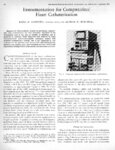1 - 25 of 11
Number of results to display per page
| Creator | Title | Description | Subject | Date | ||
|---|---|---|---|---|---|---|
| 1 |  | Christensen, Douglas A. | Computer-aided design of two-dimensional electric-type hyperthermia applicators using the finite-difference time-domain method | A hyperthermia applicator design tool consisting of a finite-difference time-domain (FDTD) technique in combination with a graphical display of electric fields and normalized linear temperature rise is described. This technique calculates, rather than assumes, antenna current distributions; it incl... | Finite-difference time-domain method; Hyperthermia applicator | 1991-09 |
| 2 |  | Harrison, Reid R. | Influence of system integration and packaging on its inductive power link for an integrated wireless neural interface | In an integrated wireless neural interface based on the Utah electrode array, the implanted electronics are supplied with power through inductive coupling between two coils. This inductive link is affected by conductive and dielectric materials and media surrounding the implant coil. In this study,... | Coils; Inductive coupling; Integration; Neural interface Packaging; Quality factor; Resonance frequency; Utah electrode array (UEA); Parylene | 2009-12 |
| 3 |  | Christensen, Douglas A. | Influence of temperature probe sheathing materials during ultrasonic heating | The influence of sheathing materials upon temperature probes used during the monitoring of ultrasonic heating was measured. The measurements show that the sheathing can be heated in a manner not representative of the temperature rise occurring in the surrounding material, altering the probe reading... | Ultrasonic hyperthermia; Sheathing; Phantom tests; Teflon | 1986-05 |
| 4 |  | Gardner, Reed M. | Instrumentation for Computerized Heart Catheterization | Biomedical Informatics | 1971 | |
| 5 |  | Horch, Kenneth W. | Intraspinal microstimulation using cylindrical multielectrodes | A cylindrical multielectrode system specifically designed for intraspinal microstimulation was mechanically and electrically evaluated in the ventral horn of the feline lumbo-sacral spinal cord. Electrode insertions proved to be straight as evaluated from radiographs. Impedances were measured in s... | Cylindrical multielectrode; Microstimulation; Neural prosthesis; Current distance constants; Electrode array; Spinal cord stimulation | 2006-02 |
| 6 |  | Furse, Cynthia M.; Gandhi, Om P. | Memory efficient method of calculating specific absorption rate in CW FDTD simulations | Specific absorption rate (SAR) distributions in man models are often calculated using the finite-difference time-domain (FDTD) method. The traditional method of calculating SAR requires calculation and storage of the three electric field components in each cell and is therefore very time- and memor... | Specific absorption rates; SAR; FDTD simulations; Finite-difference time-domain; Mass-normalized time-averaged energy distribution | 1996-05 |
| 7 |  | Horch, Kenneth W. | Microfabricated cylindrical multielectrodes for neural stimulation | The effects of spinal cord injuries are likely to be ameliorated with the help of functional electrical stimulation of the spinal cord, a technique that may benefit from a new style of electrode: the cylindrical multielectrode. This paper describes the specifications for, fabrication techniques for... | Cylindrical multielectrode; Depth electrodes; Impedance testing; Microelectromechanical systems (MEMS); Microstimulation; Impedance testing; Neural prosthesis | 2006-02 |
| 8 |  | Harrison, Reid R. | Micropower circuits for bidirectional wireless telemetry in neural recording applications | State-of-the art neural recording systems require electronics allowing for transcutaneous, bidirectional data transfer. As these circuits will be implanted near the brain, they must be small and low power. We have developed micropower integrated circuits for recovering clock and data signals over ... | Micropower circuits; Neural recording systems; Low-power CMOS circuits, RF telemetry; Transcutaneous data link; Transmitter | 2005-01-01 |
| 9 |  | Christensen, Douglas A. | Multiple sensor optical thermometry system for application in clinical hyperthermia | The thermometry system described is based upon the temperature dependence of the band edge absorption of infrared light in GaAs crystal. The design of the thermometry was completed, and the system was subjected to an extensive evaluation, including testing with tissue phantoms and microwave applic... | Thermometry; Hyperthermia applicator; Phantom tests | 1984-01 |
| 10 |  | Furse, Cynthia M. | Three-dimensional electromagnetic power deposition in tumors using interstitial antenna arrays | Abstract-Interstitial arrays of insulated antennas have shown promise for microwave hyperthermia treatment of deep-seated tumors. Available analytical techniques for predicting the electromagnetic (EM) power deposition of these antennas have been limited to the case of a homogeneous conductive mediu... | 1989-10 | |
| 11 |  | Furse, Cynthia M. | Three-dimensional electromagnetic power deposition in tumors using interstitial antenna arrays | Interstitial arrays of insulated antennas have shown promise for microwave hyperthermia treatment of deep-seated tumors. Available analytical techniques for predicting the electromagnetic (EM) power deposition of these antennas have been limited to the case of a homogeneous conductive medium surrou... | Interstitial antenna arrays; Microwave hyperthermia treatment; Invasive hyperthermia; Electromagnetic power deposition | 1989-10 |
1 - 25 of 11
